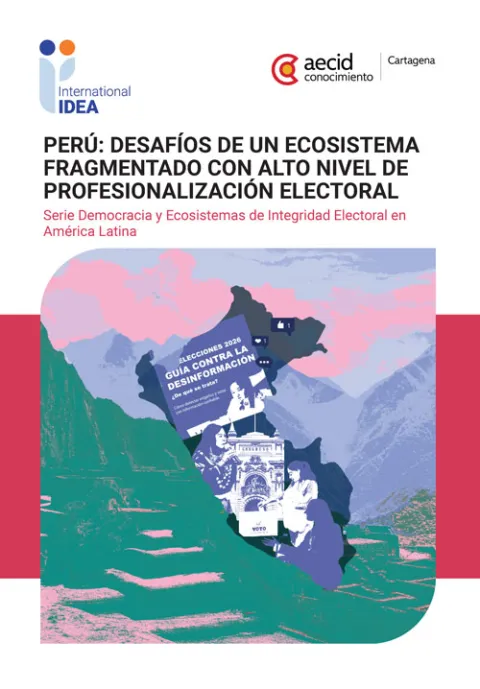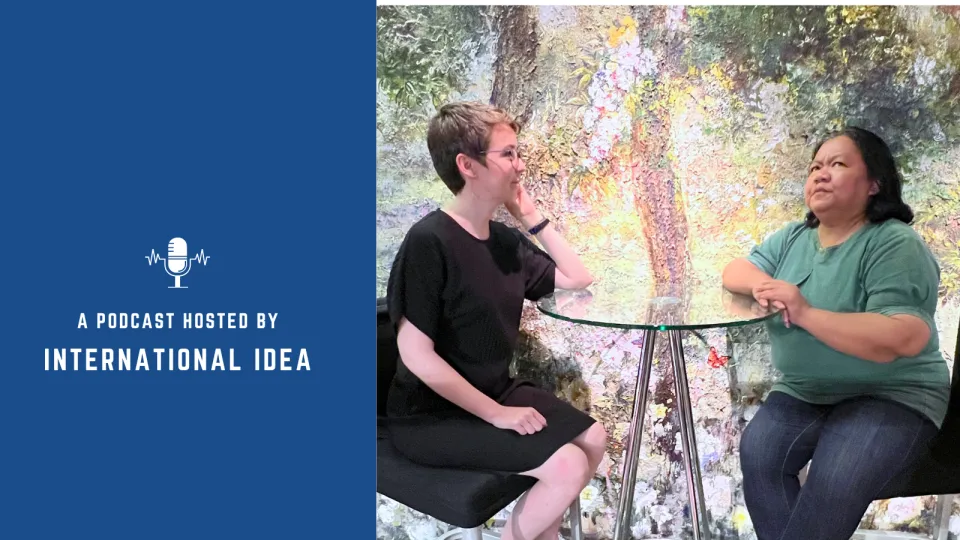International IDEA's Secretary-General, Kevin Casas-Zamora, will speak at the World Justice Forum in Warsaw, Poland, on June 24 at 10:45 CEST.
Search
Region
Country
Type
The International Institute for Democracy and Electoral Assistance, in cooperation with the Kofi Annan Foundation and the European Endowment for Democracy (EED), will host a high-level Policy Dialogue on Multilateralism, Democracy and Security, taking place on 20 June 2025, at 14:30 – 16:00 CEST, at the premises of the European Endowment for Democracy.
International IDEA is organising and convening, a High-Level Dialogue on “Re-imagining Democracy in Africa: Comparative Experiences from the Global South," together with the African Union, Open Society Foundations, Switzerland’s Federal Department of Foreign Affairs, the European Union and the Department of International Cooperation and Relations (DIRCO) of the Government of South Africa, on 19–2
We are pleased to announce the Women Empowerment & Democracy for Belarus Forum 2025, taking place in Stockholm on 16-17 June 2025.
Electoral processes are conducted in increasingly challenging environments. The Stockholm Conference on Electoral Integrity will serve as an opportunity for policy dialogue between electoral management bodies (EMBs) and electoral stakeholders, emphasising EMB leadership and independence in complex regulatory questions.
La iniciativa Atenea y FLACSO Argentina invitan a participar en el curso virtual “Violencia contra las mujeres en política”.
The lecture marks the seventh event in the Stockholm Series of Public Lectures on Climate Change and Democracy.
This initiative is a cooperation between renowned Stockholm-based institutions with a particular focus on climate change and democracy from different perspectives. It aims to inform, inspire, and engage experts and the general public alike by providing high-profile public lectures on the climate-democracy nexus, followed by debate.
The lecture marks the sixth event in the Stockholm Series of Public Lectures on Climate Change and Democracy.
In collaboration with the Asia Indigenous Peoples Pact Foundation (AIPP), International IDEA’s Asia and the Pacific programme will host a workshop on Constitutional Assessment Tools for Indigenous Inclusion, Rights and Environmental Protection. The event will take place from Monday the 26th of May to Tuesday the 27th of May in Chiang Mai, Thailand.
En un contexto global donde la digitalización transforma rápidamente la forma en que se ejerce la democracia, el Programa de Digitalización & Democracia se posiciona como un actor clave para garantizar que esta transformación respete los principios democráticos y los derechos humanos.
International IDEA will host the workshop Populism in Europe: Its Drivers and Countervailing Forces, sponsored by the Taiwan Foundation for Democracy (publisher of the Taiwan Journal of Democracy). The event will take place on May 19th at the International IDEA headquarters in Stockholm.
El seminario Ecosistemas de Integridad Electoral se realiza en el marco del proyecto “Fortalecimiento de los Ecosistemas de Integridad Electoral para Proteger las Democracias en América Latina”, financiado por la Agencia Española de Cooperación Internacional para el Desarrollo (AECID). 
In 2025, we mark 30 years since the Beijing Declaration. As the global community reflects, we ask: Are the promises of gender equality being realized?
Join a powerful panel of young women leaders who were at CSW69, as they share key insights, lessons, and bold visions for the future of women’s political participation.
Featuring:
International IDEA is pleased to invite you to the online launch of our new report, “Combatting Corruption in Political Finance: Global Trends, Challenges and Solutions,” on Wednesday, 23 April 2025, from 15:30 to 17:00 CEST.
International IDEA’s Asia and the Pacific program and the Applied Democracy Lab (ADL) at the University of Dhaka will implement the Youth Democracy Academy to selected Dhaka-based students through online learning and dialogues. This joint activity aims to enhance knowledge about democracy and provide space for students to discuss their country’s current political landscape.
As part of Legitimult, International IDEA is organizing a half-day workshop “Lessons from Covid-19 – Journalism in a Post-Pandemic Future,” taking place on 10 April at International IDEA HQ, Stockholm.
The Africa and West Asia Electoral Process Programme of International Institute for Democracy and Electoral Assistance (IDEA), in collaboration with the African Union (AU) is organizing a reflection and technical meeting on electoral processes in Africa. The meeting will take place from April 9th to 12th April 2025, in Johannesburg, South Africa.
International IDEA Secretary-General Kevin Casas-Zamora will speak at the opening reception of "Upgrading Local Democracy! Our Europe starts in cities" in Leipzig, Germany on April 7th at 19:00 CEST. The event is organized by Eurocities and the city of Leipzig.
International IDEA's Democracy Assessment Unit is hosting a discussion event on Thursday, 3 April 2025, aimed at exploring how strategic foresight can help shape democratic futures.


